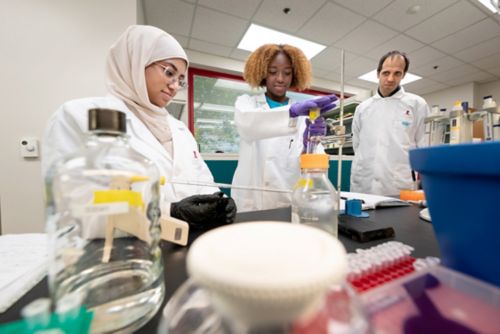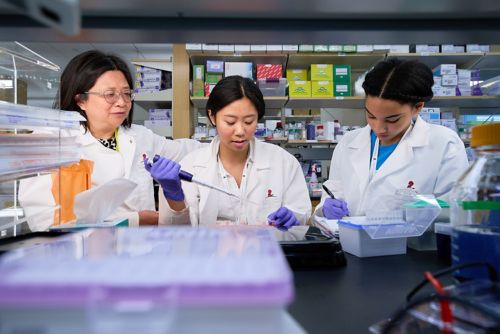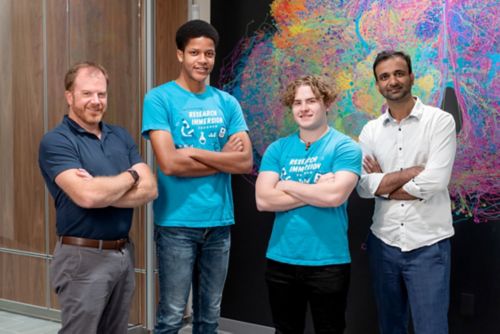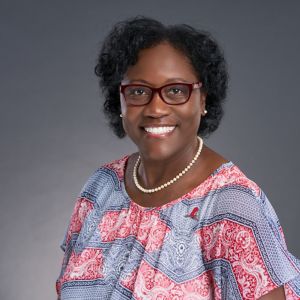St. Jude Family of Websites
Explore our cutting edge research, world-class patient care, career opportunities and more.
St. Jude Children's Research Hospital Home

- Fundraising
St. Jude Family of Websites
Explore our cutting edge research, world-class patient care, career opportunities and more.
St. Jude Children's Research Hospital Home

- Fundraising
St. Jude mentors nurture tomorrow’s scientists

Students in the St. Jude High School Research Immersion Program work with Andrey Reshetnyak (right), a senior scientist in the Department of Structural Biology.
What does it take to become a scientist? Many qualities and skills are necessary for a career in science, but undoubtedly passion, curiosity and resilience are key components of any scientific journey. Mentorship plays a critical role in helping to cultivate these qualities in individuals from an early age and is particularly important for Science, Technology, Engineering, Mathematics and Medicine (STEMM) fields. The St. Jude STEMM Education and Outreach Program places tremendous value on mentorship’s essential role in building career readiness across various biomedical disciplines.
One of the opportunities for mentorship that the STEMM Education and Outreach Program offers to the St. Jude community is the chance to mentor a high school student during the summer High School Research Immersion Program. When these students are welcomed to St. Jude, they are paired with an experienced scientist who will help them learn, grow and develop throughout their time in the program.
But outstanding mentorship doesn’t simply happen. The skills that can help an exceptional scientist become an exceptional mentor can be taught. St. Jude provides instruction on mentorship to help scientists across the research enterprise take on this pivotal role.
The essence of mentorship
Through the STEMM Education and Outreach Program, St. Jude aims to create community partnerships with schools using various outreach programs and activities that cultivate scientific curiosity for students and teachers. Through mentorship programs, young minds are exposed to the necessary tools to become the scientists of tomorrow. In its purest form, mentorship is a symbiotic relationship where seasoned experts nurture the talents and aspirations of their mentees. In the vast landscape of scientific discovery, mentorship stands as a guiding beacon, cultivating and illuminating the path for the next generation of well-rounded scientists.
Mentorship is more than disseminating knowledge or showing how research techniques are performed in a laboratory — because training is not mentorship, and mentorship is not merely training.
Mentorship instills the passion, curiosity and resilience necessary for a successful scientific journey. It can serve as a mechanism to advance inclusive and diverse environments, particularly in STEMM fields where diversity is often lacking. Positive mentorship creates an environment that helps to uncover and address key factors contributing to engagement barriers and positive science identity in research settings. Positive and intentional mentorship practices drive sustainable engagement for those interested in pursuing future careers in STEMM fields.
Building career readiness across disciplines
Mentorship is the cornerstone of any thriving workforce. It is especially essential in STEMM fields where knowledge transfer is never static but is instead a dynamic exchange of extensive collaborative efforts. A mentor’s role transcends providing mere knowledge; it involves honing essential soft skills, fostering critical thinking and offering guidance for challenges beyond the laboratory. Adaptability and problem-solving skills are paramount in the current evolving landscape of STEMM disciplines.

Hong Lin, PhD, Department of Developmental Neurobiology, works with students Emily Zhao (center) and Kayla Henry.
Through mentorship, budding scientists, as early as high school, can be exposed to and able to develop a holistic skill set that empowers them to face complex problems with poise and resilience by interacting with global leaders in research. Mentors bring a unique passion and commitment to the mentor-mentee relationship that becomes motivating and life-changing for many aspiring scientists. This approach often results in sustained impactful connections where mentors serve as role models and continue to make a difference in the mentees’ lives as they navigate the intricate web of their future careers.
The mentorship experience
The legacy of any research institution lies in its ability to nurture the next generation of scientists. St. Jude works continuously to equip its staff with the knowledge and tools to be effective mentors through opportunities for mentor training. The result is an environment where curiosity flourishes, innovation thrives and young scientists realize their full potential. Mentoring relationships are integral in fostering the development of positive scientific identity and ensuring the retention of future scientists in STEMM fields.
The Research Immersion Program slogan, “Nurturing our Future”, sends a clear message to everyone that participating in cutting-edge research showcases the transformative power of mentorship. For example, during the 2023 High School Research Immersion Program, Emily Zhao, a high school senior with a passion for science since childhood, was paired with Hong Lin, PhD, a senior scientist within the Department of Developmental Neurobiology. According to Zhao, the journey from classroom curiosity to actively participating in scientific exploration was life changing. She attributes her interest in pursuing a career in biomedical research to Lin’s guidance. Lin’s passion for mentorship and desire to help students recognize their strengths, build resilience and expand their scientific curiosity helped Zhao see that science was the right fit for her.
In addition to developing skills in the laboratory and in a professional environment, the Research Immersion Program also prioritizes developing communication skills — for both the students and their mentors.
Communicating with high school students
How do you take highly complex science and distill it down so that a high school student can grasp the concepts? It takes excellent communication skills. Before starting the Research Immersion Program, The STEMM Education and Outreach team invests time in mentor training workshops to equip the scientist mentors with information on the value of inclusive and equitable mentorship training, including best practices and structural supports. The mentors all develop a shared expectations and norms agreement with their mentees, which serves as both an accountability and interaction tool for creating a constructive and engaging learning environment.
Mentor training goes beyond imparting scientific knowledge and skills. It also develops the art of scientific communication, science identity, ethical considerations and even effective near-peer collaboration during weekly workshops.

Giles Robinson, MD, (left) Division of Neuro-Oncology director, and Sandeep Dhanda, PhD, (far right) a senior bioinformatics research scientist work with students from the Research Immersion Program.
For scientists who want to improve their science communication skills, the STEMM Education and Outreach Program offers the Memphis Science, Technology, Engineering, Math and Medicine (MemSTEMM) Ambassadors Classroom. The classroom is a four-part professional development series aimed at improving scientists’ communication skills through storytelling, reducing jargon, simplifying concepts and promoting audience interaction through a virtual platform. Through the series, scientists produce a lay summary and slide presentation based on a journal article they authored or one that is closely related to their research.
These workshops enhance the participating scientists’ verbal and written skills through presentation, helping hone their ability to distill complex concepts into formats accessible to high school students. After the conclusion of the workshop series, the researchers are given the opportunity to practice their presentation skills by engaging high school students during a Virtual Journal Club. Each scientist presents their article to at least three different high school science classrooms. These presentations allow the scientists to interact directly with younger audiences and receive real-time feedback on their ability to convey their research discipline and expertise.
Scientists are also invited to give career talks to students in grades K-12. Having to prepare an engaging discussion of their career journeys, scientists develop a clear and helpful mental map of career pathways to share with future mentees. The exercise helps to bring clarity and precision to the interactive discussion.
The STEMM Education and Outreach team also partners with a group called the Memphis STEM in Medicine Ecosystem. This partnership provides aspiring mentors with a community of higher education partners from various schools and the state-level education department. The group shares best practices and allows a safe place to share experiences and seek support for initiatives and programs geared at providing access and opportunity for youth to engage in authentic science experiences in Memphis and Shelby County, helping address issues of equity within STEMM education in Memphis and Shelby County.
Interested in becoming a mentor?
The STEMM Education and Outreach Program needs mentors for the 2024 Summer High School Research Immersion Program. To participate in this or any other mentor training or communication activities run by the program, visit our website. We can all work together to illuminate the path to a brighter, more scientifically curious future.






